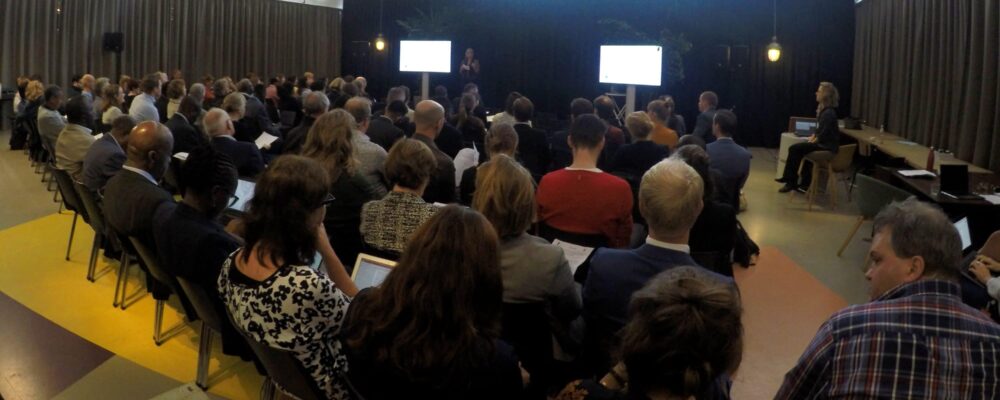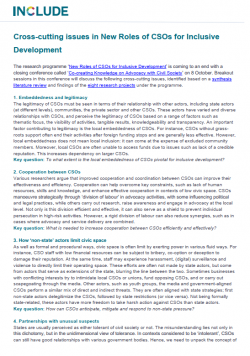
Supporting grassroots movements is often praised as both an inclusive process and an inclusive outcome. This recognizes the importance of local agency and can be a catalyst for social change. Many policymakers, including the Dutch Ministry of Foreign Affairs, acknowledge the importance of supporting grassroots civil society organizations and make efforts to empower these strategic actors. However, research on the issue shows that a lot can be improved. The main question is not what can be improved, but what roles the various actors involved can play.
The closing conference of the research programme ‘New roles for CSOs in inclusive development’, titled ‘Co-creating knowledge on advocacy with civil society’, took place on 8 October in The Hague. In line with its purpose of co-creating and sharing knowledge, the conference drew on the findings of researchers and insights from policy and practice provided by representatives of civil society organizations (CSOs) and the Ministry of Foreign Affairs (MFA). A snapshot of this conference, including some concluding remarks, can be found below.
From themes, projects and assumptions to cross-cutting issues.
A large share of the morning was devoted to the final findings of the 8 research projects, presented by the project leaders (see box below). These findings built on the findings shared in the conference ‘Research for Dialogue & Dissent 2.0’ and the seminar on how non-state actors influence the operational space for CSOs held earlier this year, where it was concluded that although the projects worked on different research questions in different contexts, they came up with similar findings. In the process of synthesizing these findings, the INCLUDE Secretariat and The Broker have identified 8 cross-cutting issues (see box below), which were discussed during breakout sessions in the afternoon.
Box 1: research projects and their cross-cutting issues
| 8 research projects
1. Civil society advocacy collaborations in India 2. Civil society against corruption in Ukraine 3. Civil society engagement with land rights in Kenya 4. CBOs within the official development aid system in Kenya 5. Enabling rules for advocacy in Kenya 6. CSOs in sustainable development in Kenya 7. Dilemmas in sustainable development and civil society in Bangladesh and Zambia 8. Non-state actors and civic space in Zimbabwe, Bangladesh and Palestine |
8 cross-cutting issues
1. Legitimacy and embeddedness 2. Cooperation between CSOs 3. How ‘non-state’ actors limit civic space 4. Partnerships with unusual suspects 5. Dynamic support in limited civic space 6. Project-based funding 7. Roles of international NGOs 8. Operating in low civic space. |
These cross-cutting issues allowed for various important discussions, such as on strategic coalition-building between CSOs, the potential of trust-building of CSOs within a competitive donor landscape, the type of knowledge that CSOs require, incentives for private sector engagement, the outdated distinction between service delivery and advocacy as separate activities, the detrimental effect of short-term, project-based funding, addressing power relations within the aid chain and manoeuvring strategies for CSOs within limited civic space.
These discussions were followed by a closing panel with McDonald Lewanika (London School of Economics), Bart Romijn (Partos), Nicola Banks (University of Manchester) and Sara Ruto (PAL Network and INCLUDE). This programme was opened by Adrie Papma (Chair of the day) and Jelmer Kamstra (Ministry of Foreign Affairs) and closed with remarks by Jeroen Kelderhuis (Ministry of Foreign Affairs) and Isa Baud (INCLUDE).
Moving closer to the ground: not ‘if’, but ‘how’ and ‘by whom’
When it comes to the value of supporting CSOs, the vision of enabling social transformation and the knowledge of the constraints and challenges that CSOs face, there appears to be a large amount of understanding on the part of the researchers, policymakers and practitioners who participated in the conference. This was underlined by Jelmer Kamstra, who described many of the issues raised as ‘preaching to the choir’. In his presentation, he outlined how the Ministry is moving from a managerial approach to supporting CSOs to one where the Ministry enables social transformation and donors play a facilitative role in equal partnership with the CSOs.
Perhaps the most noteworthy conclusion of the day is that the main challenge lies not in a lack of understanding of what issues CSOs face and how these constrain them in their daily activities, but in identifying the power dynamics along the aid chain and empowering the right actors that can enlarge operating space. This brings to mind an important theme raised by INCLUDE since its inception: inclusive development is not only about designing the right policies, but identifying and empowering strategic actors that can enforce and implement them.
Research is of paramount importance in this process: not only to provide evidence on what policies work and what don’t. According to Isa Baud: “researchers provide analytical frameworks, compare them and bring these to policy discussions” to contribute to evidence-based policymaking in a dialectic manner. The research programme ‘New roles of CSOs in inclusive development’ has been a prime example: through the involvement of all relevant actors, including policymakers, since the beginning, the co-creation of knowledge and ongoing dialogue have contributed to rich and policy-relevant discussions and the building of networks that will last beyond the duration of the programme.
